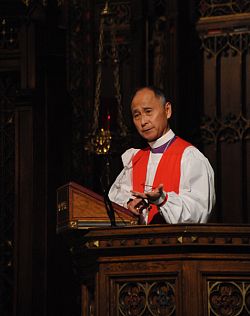Bishop Hayashi at the Cathedral of the Madeleine: Episcopalians and Catholics are 'united in Christ'

SALT LAKE CITY — As an expression of Christian unity, the Right Rev. Scott B. Hayashi, Bishop of the Episcopal Diocese of Utah, preached at the Cathedral of the Madeleine’s 11 a.m. Mass on Feb. 9. The Most Rev. John C. Wester, Bishop of Salt Lake City, presided at the Mass, which was concelebrated by Father Martin Diaz, pastor of the Cathedral of the Madeleine; and Father José Barrera-Hernandez, the parochial vicar. Deacon Scott Dodge assisted. Three weeks previously, Bishop Wester had preached at the Cathedral Church of Saint Mark as a way of marking the annual international Week of Prayer for Christian Unity. The two bishops agreed to the pulpit exchange "because in this world, the sad truth is that people expect religious people to disagree with each other more than they agree, and when we do that we are not like a city set on a hill, we are not the light of the world, and we are not witnessing to Christ crucified," said Bishop Hayashi in his sermon, referencing that Sunday’s Gospel reading, Mat 5:13-16. "You and I, as Roman Catholics and Episcopalian, have many more ways that we share things in common than we have differences," Bishop Hayashi continued. For example, he and Bishop Wester work together on issues such as immigration reform, Medicaid expansion and air quality, he said. "Now, of course, there are differences," Bishop Hayashi acknowledged, but what is important is "what we share together most is nothing other than Christ. And, frankly, in my opinion, if what we share together is Jesus, then by heaven we have unity." Prior to the Mass, Bishop Hayashi answered questions from a small public group, as Bishop Wester had done at the Cathedral Church of St. Mark. Both groups focused primarily on the differences between the two churches. For example, Bishop Wester was asked about the authority of women in the Catholic Church, Bishop Hayashi said, adding that he believed the group understood the answer. "Whether they agreed or not is another question. But I don’t really believe that Bishop Wester really expected them to agree, but to understand," he said. Bishop Wester concurred, saying that his goal was to explain, not to persuade. "That’s the whole point of this, to start more dialog and deepen the bonds that unite us, and get to know one another better so that we can work together," he said. When religious leaders talk about Christian unity, "the more we understand, the closer we can come. When there’s doubt and there’s confusion, when there’s misunderstanding, that’s when we have division." This type of theological conversation is occurring on both a national and international scale as well as locally, Bishop Hayashi said, adding that he believes without that wider conversation he and Bishop Wester likely would not have exchanged pulpits. In response to questions from the audience, Bishop Hayashi gave an overview of the organization of the Episcopal Church, which he described as having a bicameral government that "results in a very lively exchange theologically," he said. Bishop Hayashi also touched on the Episcopal Church’s ordination of women, acceptance of same-sex marriage, and its stance on abortion. Although the Catholic Church differs with the Episcopal Church on these matters, "when you get down to the experience of being a spiritual person or a Christian person, I can’t tell much of a difference between when I pray and when Bishop Wester prays," Bishop Hayashi said. Despite the differences, "We share a great deal in common. We share a certain understanding of what the sacraments are, we share the same understanding about Jesus and we have the same understanding of the Trinity," he said. Although Bishop Hayashi said he doubts that the Episcopal and Catholic churches will ever reach the place where they agree on everything, he believes that because they already share Christ Crucified, the differences are acceptable. "The most important thing is to follow the mission that God has given us," he said. "More important, frankly, than uniformity is being faithful to the mission of the church: proclaiming the Gospel, baptizing people in the name of the Father, the Son and the Holy Spirit. That should be the most important thing to all of our churches, as opposed to working out the details on which we do not agree."
© Copyright 2024 The Diocese of Salt Lake City. All rights reserved.

Stay Connected With Us